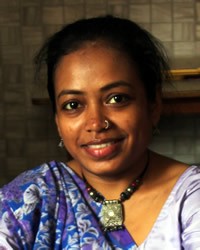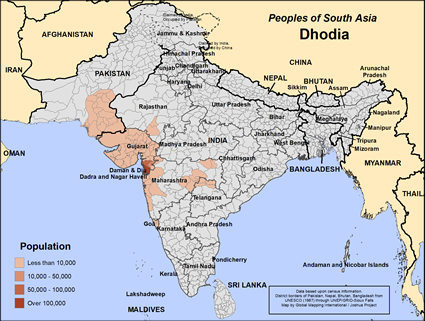Dhodia in India

Photo Source:
Kajal84 - Wikimedia
Creative Commons
|

Map Source:
People Group data: Omid. Map geography: UNESCO / GMI. Map Design: Joshua Project.
|
| People Name: | Dhodia |
| Country: | India |
| 10/40 Window: | Yes |
| Population: | 688,000 |
| World Population: | 699,000 |
| Primary Language: | Gujarati |
| Primary Religion: | Hinduism |
| Christian Adherents: | 0.08 % |
| Evangelicals: | 0.00 % |
| Scripture: | Complete Bible |
| Ministry Resources: | Yes |
| Jesus Film: | Yes |
| Audio Recordings: | Yes |
| People Cluster: | South Asia Tribal - other |
| Affinity Bloc: | South Asian Peoples |
| Progress Level: |
|
Introduction / History
The Dhodia are located in the extreme southeastern districts of Gujarat, a state in northwestern India. Their villages lie in the hilly regions south of the Tapi River. The Dhodia is the highest ranking tribe and the third-largest tribal group in Gujarat. They speak Dhodia, a Bhil language.
Long ago, prosperity within Gujarat State attracted people from all the surrounding states. Gujarat became a target of the Maratha tribes, who made annual raids to the region for several years. Eventually, the Muslims fortified the area east of Surat in order to reap its economic benefits. War continued between the Mughals, the Maratha, and the Portuguese over the Gujarat territory.
By 1817, the British had risen to power. In the years that followed, they attempted to mend what the Maratha had left by dispersing farmland among the settlers. In 1930, Mahatma Gandhi demanded the British to withdraw from India. The Dhodia, a non-aggressive people, retreated deeper into the hills during the conflict.
What Are Their Lives Like?
The Dhodia consider themselves to be of a higher class than the neighboring Bhil groups. They will not marry other Bhil or even eat with them. The exception is with the Chodhari Bhil. They have more than one wife when they can afford it. The wives are bought while they are still young girls. In times past, it was customary to take the bride to the groom's house for the wedding. Today, however, the young couple generally travel to the bride's house to be married. A widow usually remains a part of her husband's family by marrying her deceased husband's brother.
The Dhodia participate in festivals alongside the Hindus who live nearby. They are not really community-minded but only come together for such things as annual communal fishing and religious feasts. Village leaders only perform certain social duties.
The Dhodia are related to the many Bhil tribes of India. The name "Bhil" comes from the word billee, which literally means "bow." The bow is the characteristic weapon of most Bhil tribes. Ironically, the Dhodia, unlike their Bhil relatives, do not use bows and arrows.
Most Dhodia have given up the nomadic lifestyles of their ancestors and have settled into farming. Forest labor, trade labor (in the cities), hunting, and fishing are secondary to agriculture. Some live in the Surat district, an area well known for its rich soils and fine cotton crop. Others live in areas where, because of the heavy rainfall, they are able to cultivate rice. Still others live in the less fertile, highland areas.
The Dhodia go to the markets to trade their crops for clothing. The women wear blouses under dark green or red cotton saris (long pieces of cloth that are wrapped around the waist and over one shoulder). They also wear necklaces made of lead beads and rupee coins, and silver anklets. Shorts are common among the men.
Dhodia houses are usually scattered near the streams so that they might easily fish and draw water for themselves and their cattle. The homes are typically built by hired labor. They are small bamboo huts made with tiled roofs. The poorer Dhodia live in mud huts that they build themselves. The doors always face north in order to prevent interaction with evil spirits.
What Are Their Beliefs?
The great majority of the Dhodia Bhil practice ethnic religions. Clans have their own deities. They have deep-rooted beliefs in demons and witches. They worship groups of deities made of shapeless pieces of stone or wood. The Dhodia have no temples or places to hold their religious ceremonies. They have only a few stones that have been painted and placed under trees. They believe that the supernatural beings dwell there.
Along with their own religion the Dhodia practice Hinduism. They are especially fond of Hindu festivals such as Diwali and Holi.
What Are Their Needs?
Many Dhodia are addicted to alcohol and will sell all they possess for a drink. They need to experience the liberating power of Jesus Christ.
Prayer Points
Pray that God will reveal Himself to the Dhodia through dreams and visions.
Pray for the Dhodia people to have an intense hunger for truth and righteousness.
Pray for Dhodia disciples who will make more disciples who will make even more disciples.